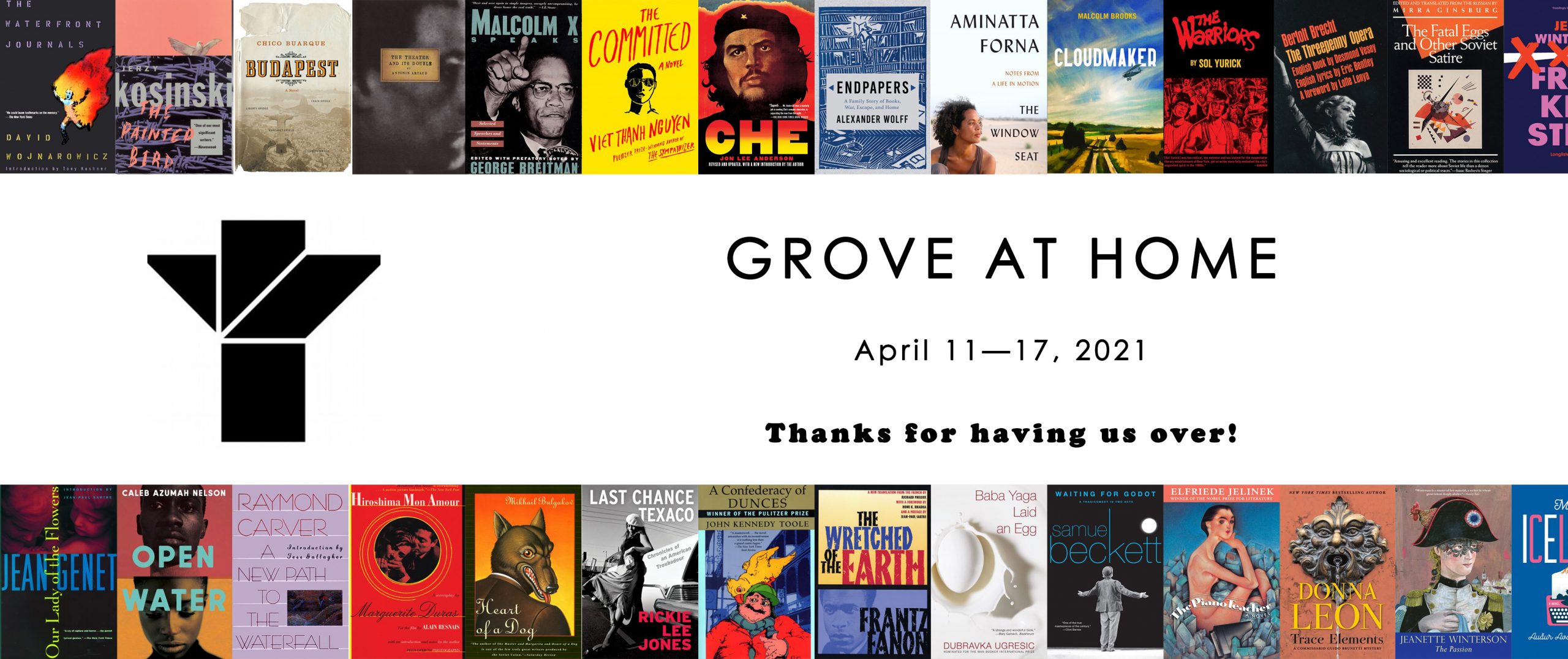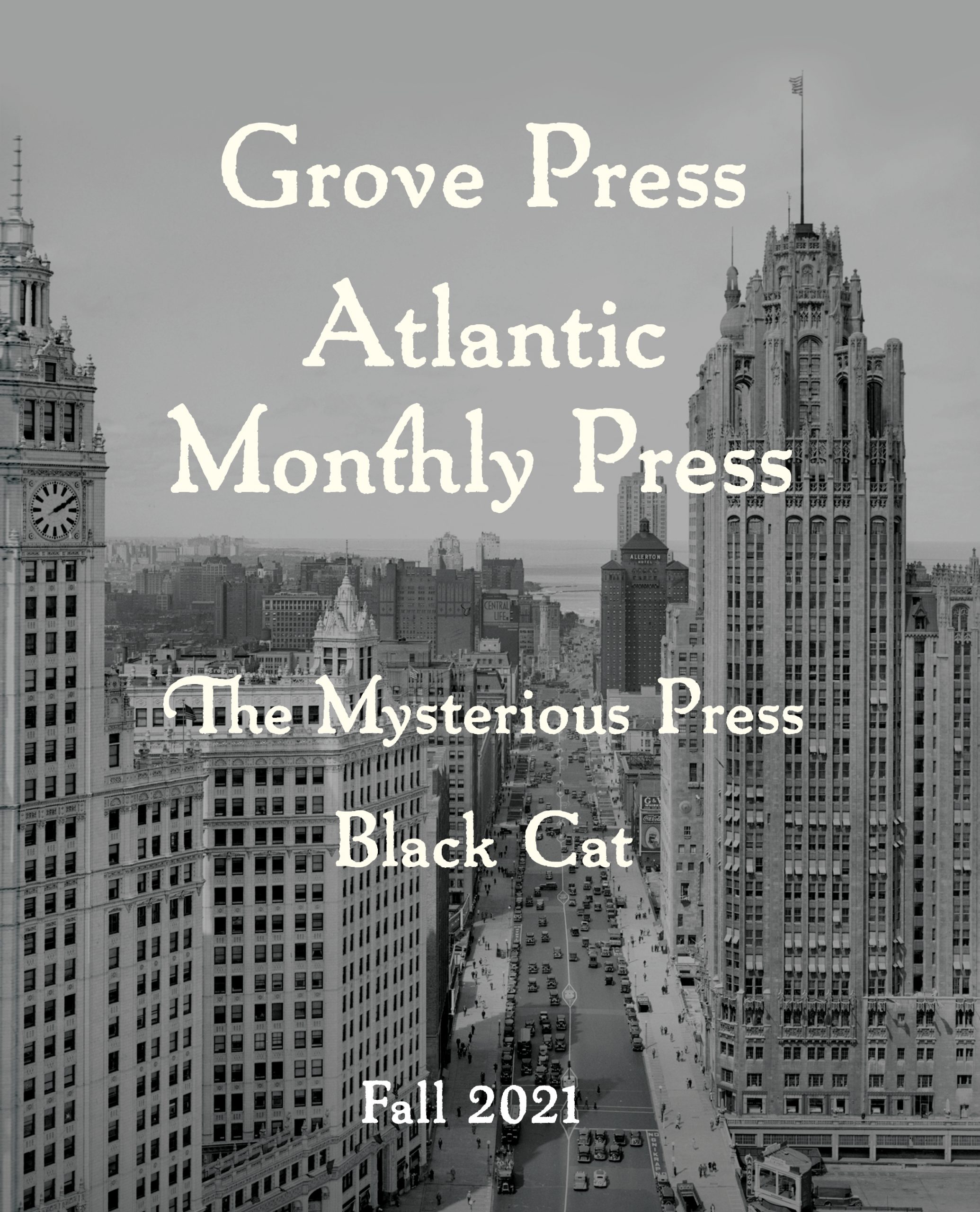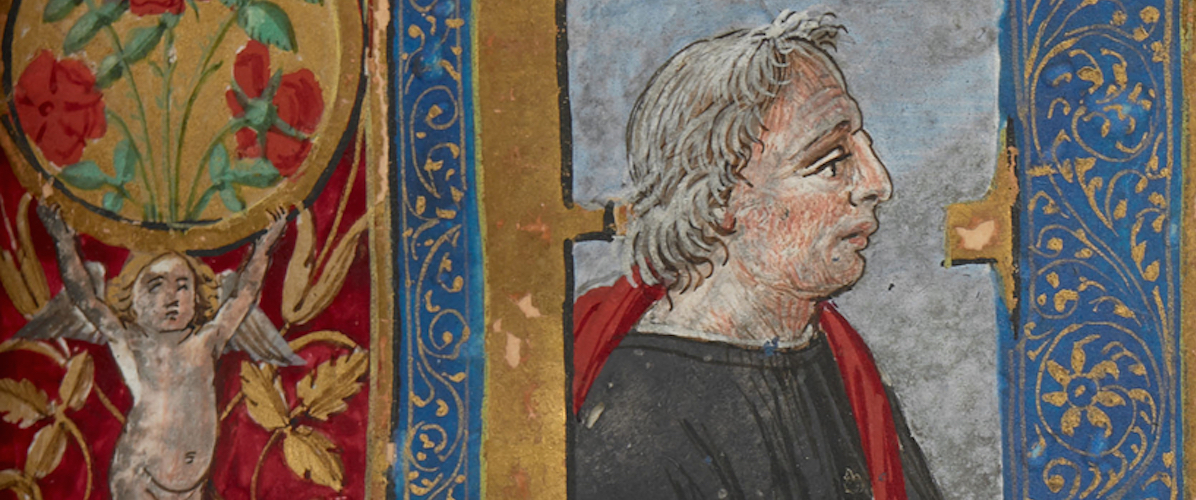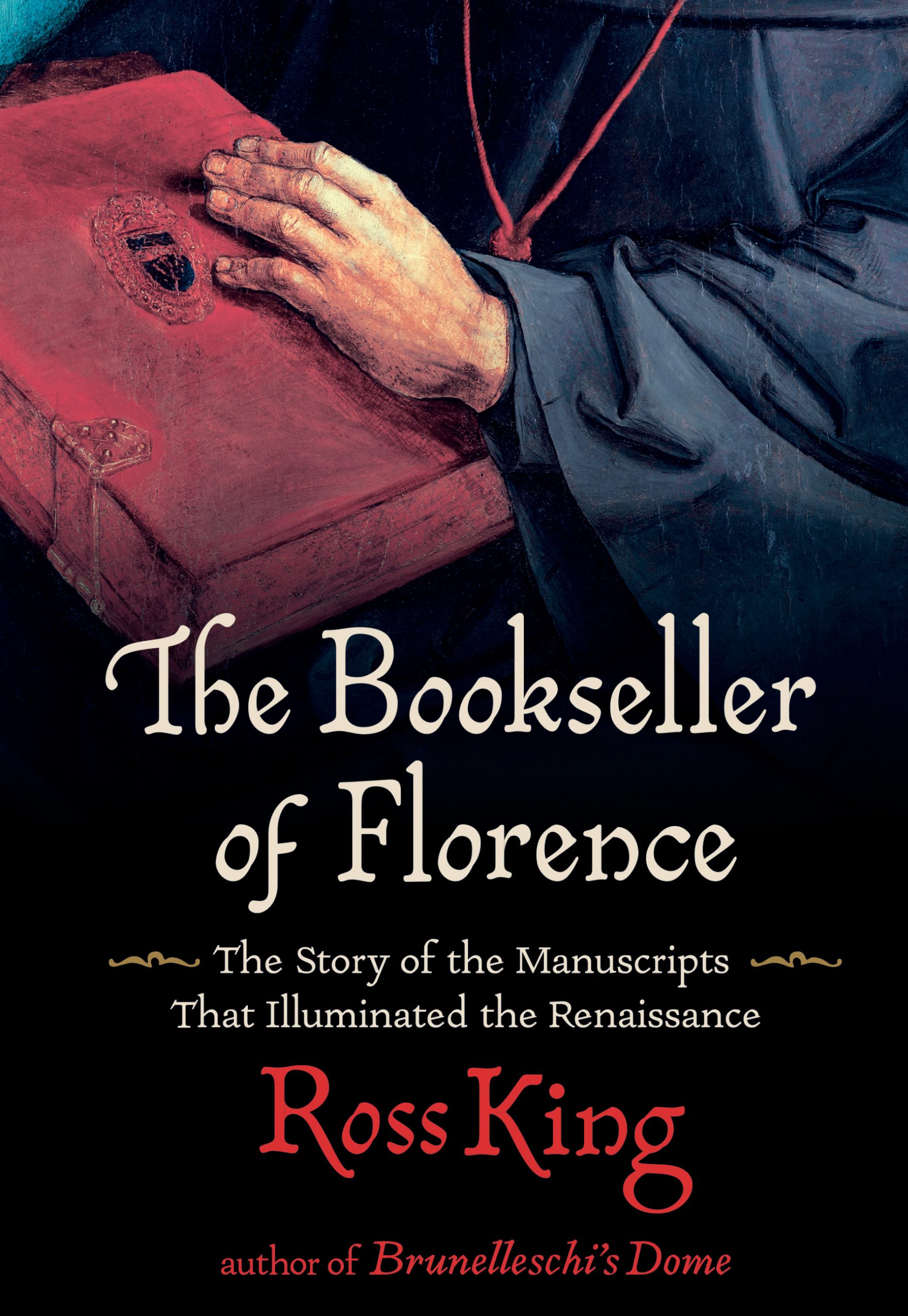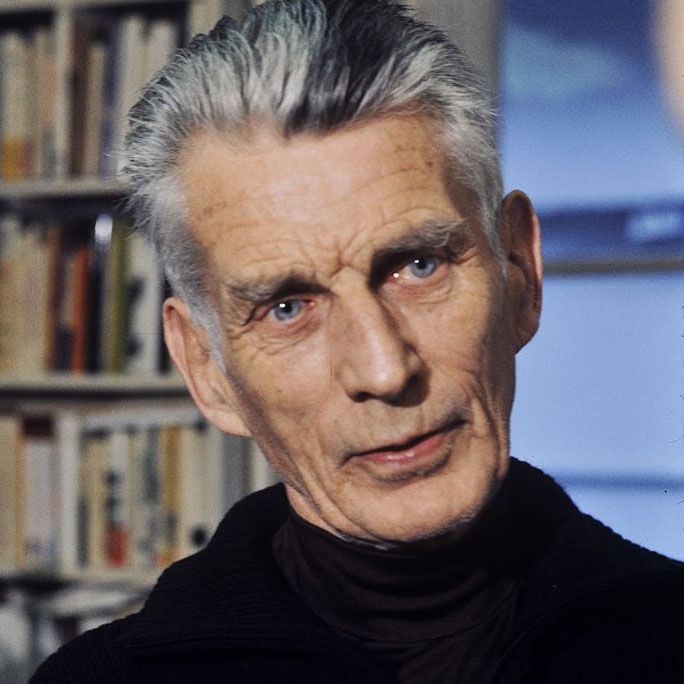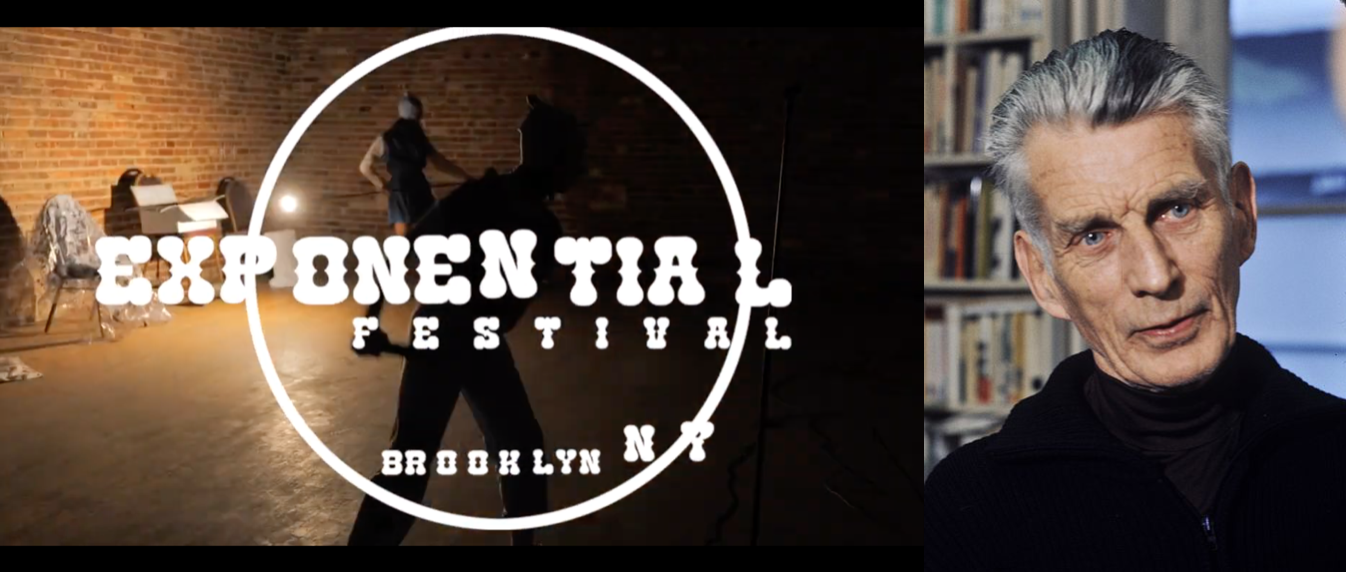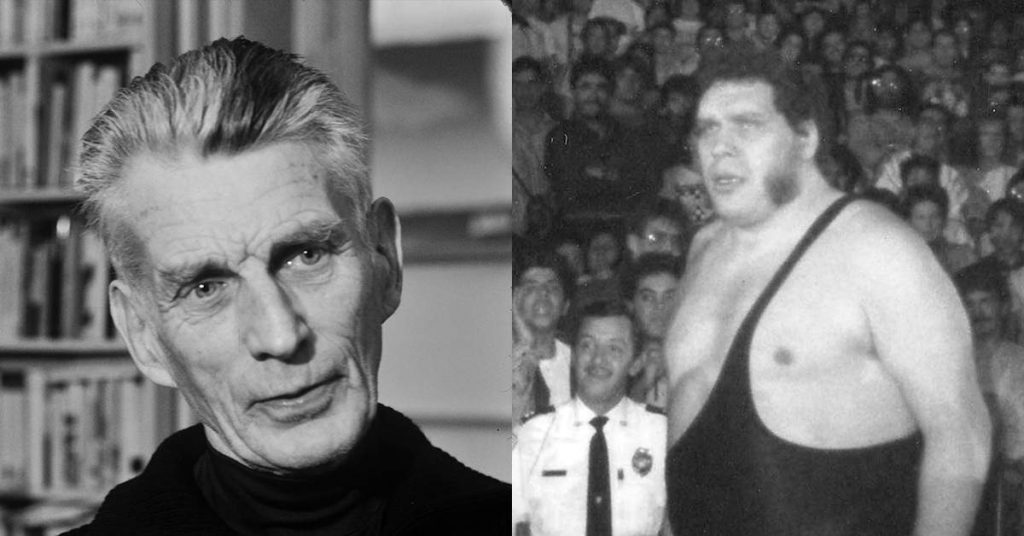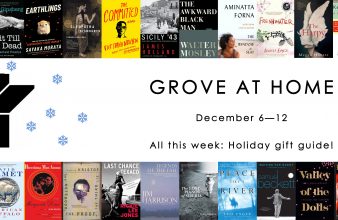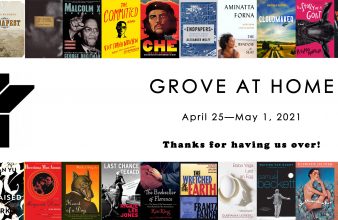News Room
Welcome to Grove at Home!
Every weekday, from now until we’re all out of the house again, we’ll be sharing a couple of links — some fresh, some from the vault — to say hi, remind you to keep reading, and let you know what’s on our minds.
Friday, April 16
Today marks the 67th birthday of legendary actor Ellen Barkin — one of the greats! We’re wishing her a very happy one, and enjoying this trailer for Siesta, Mary Lambert’s 1987 directorial debut, with an impressive cast that features Martin Sheen, Isabella Rossellini, Jodie Foster, and Grace Jones, in addition to Barkin and Irish actor Gabriel Byrne, whom she would marry the next year. While Byrne first achieved fame as one of the leading screen stars of his generation, the world learned when we published his memoir Walking with Ghosts earlier this year that he is also, in the words of Edna O’Brien, “a man whose amazing story is the stuff of literature,”, as well as, to quote Booklist, “an exceptionally lyrical and expressive” writer. Here’s Byrne, Barkin, and a very impressive cohort of thespians in the trailer for Siesta:
Check out our new catalog!
If you’re looking to feel psyched for the future, may we recommend our Fall 2021 catalog?! We’ve got some hugely exciting stuff coming, from a new biography of blues legend B.B. King by Daniel de Visé to the latest from Jeanette Winterson to Lily King’s first-ever short story collection. Give it a browse! (You can always check out all the past few years’ catalogs here.)
Click here to read our full Fall 2021 catalog…
B.B. King sings “How Blue Can You Get?”
“I’ve been downhearted, baby / Ever since the day we met.” “How Blue Can You Get?” is one of B.B. King’s signature tunes, and this brief, live performance, on the Ed Sullivan Show in 1970, is guaranteed to shake any and all of the dust off your soul. We can’t wait to publish King of the Blues, Daniel de Visé’s biography, later this year! And rest assured, we’ll have more fantastic musical performances to share!
Thursday, April 15
Dantiel W. Moniz in conversation with Melissa Broder
A few weeks ago, Dantiel W. Moniz, the brilliant author of Milk Blood Heat, and Melissa Broder, the brilliant author of Milk Fed, had a brilliant conversation hosted, brilliantly, by Book Soup. After reading from both books, they touched on the dualities of girlhood, the art of TV-adaptation-as-fan-fiction, and much more. If you missed it last month, watch it right here.
Ross King on making books in the 1400s
As we continue to celebrate publishing Ross King’s The Bookseller of Florence this week, we’re reading this adapted excerpt over at Literary Hub. From the author of Brunelleschi’s Dome and The Judgment of Paris, The Bookseller of Florence is a look at the life of Vespasiano da Bisticci, who figured prominently in the manuscript trade that would fuel the Renaissance. The excerpt concerns itself with the physical production of the manuscripts themselves — which means it begins, of course, at the butcher shop.
“Producing new manuscripts of Cicero’s writings in the middle of the 15th century was clearly a more laborious and involved enterprise than combing the sleepy shelves of Franciscan libraries for neglected codices. The word ‘manuscript’ comes from the Latin manu scriptus, ‘written by hand,’ but any manuscript was the product of much more work than simply the writing of a single hand. It was a months-or even years-long, multistep process calling for the expertise of a series of tradesmen and specialist craftsmen, from parchment makers to scribes, miniaturists, goldbeaters, and even apothecaries, carpenters, and blacksmiths.” Continue reading…
Bach’s Second Cello Suite
You just can’t beat this recording of JS Bach’s Cello Suite Number 2 in D minor, being performed by Steuart Pincombe for the Netherlands Bach Society. Enjoy! And if you’d like something to read while you listen, we have just the thing.
Wednesday, April 14
156 years ago today, President Abraham Lincoln was shot during a performance of Tom Taylor’s Our American Cousin at Washington’s newly opened Ford’s Theatre. It had been only days since a Union Victory at the Battle of Appomattox Courthouse brought the American Civil War to a close. In this video, recorded last month for the Abraham Lincoln Presidential Library Foundation, Ed Achorn, author of Every Drop of Blood — a definitive account of Lincoln’s second Inaugural Address, and one of the most vivid, nuanced, and acclaimed portrayals of Lincoln ever put to paper — talks with historian Christian McWhirter, covering topics as varied as Lincoln’s views on the Bible, how campaign songs that portrayed Lincoln as a tyrannical race-traitor complicate our contemporary sense of him as universally admired, and much more.
Booth Shot Lincoln, played by Tony Trischka
If you’re looking for some thematically-relevant music to play as you log into Bookshop to order your copy of Every Drop of Blood, look no further than Tony Trischka’s 1993 recording of Booth Shot Lincoln, an instrumental song of the time that helped spread the sad and alarming news of the president’s assassination.
Ross King talks to Deborah Kalb
Yesterday, we had the extreme pleasure of publishing The Bookseller of Florence, a fascinating look at the life of the little-known bookseller Vespasiano da Bisticci, whose manuscripts played an outsize role in the intellectual cross-pollination that reached its climax in the Florentine Renaissance. The latest book by the acclaimed author Ross King, author of Brunelleschi’s Dome, it’s already drawing raves — just yesterday, Sir Simon Schama wrote in the New York Times that “if you want to celebrate the place that bookmaking and bookselling still have in our lives… you could do a lot worse than immerse yourself in Ross King’s rich history.” (Seconded!) Today, we’re celebrating in part by reading this excellent conversation between Ross and Deborah Kalb, published at Kalb’s blog. It makes an excellent introduction to the book.
“For a long time I’d wanted to do a book on manuscripts in Florence, and so Vespasiano, as the biggest manuscript dealer in Europe, was an obvious choice as a place to start.
“But the more I read about him, the more I realized that he was the perfect person to help me give a panorama of Florence in the 1400s. He knew absolutely everyone, from popes to kings and princes, to three generations of the Medici.” Continue reading…
Tuesday, April 13
Happy birthday, Samuel Beckett
Today marks the 115th anniversary of Samuel Beckett’s birth! A playwright, novelist, translator, poet, and theater director, Beckett appears on any shortlist of the most influential writers of the twentieth century. He received awards including the 1969 Nobel Prize, the French Resistance Medal, four Obies, and election as Saoi of Aosdána.
Here’s an absolute jamboree of material to watch and read, some that we’ve shared before, and some here for the first first time.
Samuel Beckett wanders the streets of Berlin
There’s no better way to spend four minutes than gazing happily at this footage of a bemused Samuel Beckett acting the flâneur around late-sixties Berlin. (Especially love the footage of Beckett walking-and-talking with a friend around the three-minute mark — oh, for a time machine and a parabolic mic!)
Beckett and failure: “Always writing his own dispossession”
In January 2020, scholar Eva Kenny published a wonderful rumination Samuel Beckett, failure, and much more. In more recent weeks, the academic and activist Cornel West has deployed Beckett’s famous dictum, from 1983’s Worstward Ho, to “Try again. Fail again. Fail better.” as an inspiration to the global movement for Black lives, calling it “the blues line of our Irish brother.” Kenny explores the phrase in a more porous way, finding in Beckett’s later work “a set of ideas around the failure and endurance of language that had been sanded down to a state of prehistoric refinement over thirty years” — and applying a Beckettian logic of failure to an analysis of the likes of Donald Trump and Boris Johnson. Extremely worth a read.
“In midsummer 2016, as I drew ever closer to finishing a long doctoral dissertation on Samuel Beckett, I described to a friend’s boyfriend my alarm at the trend towards portraying a popular, uplifting Beckett that I kept reading about in the New York Times weekend supplement. I was worried I would have to change my topic. The lines that appeared again and again, everywhere, as if in a nightmare, are: ‘Ever tried. Ever failed. No matter. Try again. Fail again. Fail better.’ Taken from the first page of Beckett’s late prose work Worstward Ho, the phrase was, for a while, Silicon Valley’s mantra, along with ‘Move fast and break things.’” Continue reading…
Not for nothing, Samuel Beckett is relevant during the pandemic
Beckett is certainly a writer whose work and thinking seems increasingly relevant as many of us gaze in bewilderment at the lockdown’s one-year mark in the rear-view. Theater critic Laura Collins-Hughes wrote earlier this year in the New York Times about two particular films worth mentioning as part of 2021’s socially-distanced Exponential Festival, dedicated to New York City-based emerging artists working in experimental performance. Called “The Puzzlers” and “The Puzzlers 2: Black Box,” they were credited jointly to Beckett and Jess Barbagallo, and riffed on Beckett’s early-fifties “Texts for Nothing” in what Collins-Hughes called “a heightened, deadpan loopiness that elicits belly laughs.”
“In ‘The Puzzlers,’ an actor named Jay (Barbagallo, who shares the writing credit for both scripts with Beckett) is at home in Brooklyn with his acting coach (Lucy Kaminsky) and his dog (Bluet), struggling to memorize a section of ‘Texts for Nothing.’ His grown daughter (Davis) interrupts, scandalized that he spent $7.49 on a little tub of almond pesto.” Continue reading…
Oh, Nothing, Just Camcorder Footage of Samuel Beckett Watching a TV Production of His Own Play
Samuel Beckett! Watching his work! On VHS! This utterly marvelous clip also features some commentary by Professor Stanley Gontarski, co-author of The Grove Companion to Samuel Beckett, as well as editor of and consultant on a great many of our Beckett books. This clip cannot be watched enough times. Try it, you’ll see.
An interview without words, starring Guess Who…
The past February, the brilliant bibliophages of Literary Hub shared something truly wonderful: video from a 1969 interview Samuel Beckett, fresh off winning the Nobel Prize in Literature, gave to a Swedish TV crew. Beckett had only only stipulation: there was to be no speaking. The resultant clip is… everything. True to form, Beckett manages to convey a surprising amount of personality without uttering a word.
Samuel Beckett at the School of Life
This video, from the School of Life, offers some great trivia about Beckett (did you know he attended the same high school as Oscar Wilde? or that he was, in his youth, a gifted cricketer?) and some more meaningful insights into his writing, and his world. Worth watching!
The Truth About André the Giant and Samuel Beckett
You may have read about it: Samuel Beckett’s friendship with a young André the Giant, has been the focus of tremendous internet attention. Perhaps best-known is this Open Culture story, which gets at the gist:
“In 1958, when 12-year-old André’s acromegaly prevented him from taking the school bus, the author of Waiting for Godot, whom he knew as his dad’s card buddy and neighbor in rural Moulien, France, volunteered for transport duty. It was a standing gig, with no other passengers. André recalled that they mostly talked about cricket, but surely they discussed other topics, too, right? Right!?”
This is obviously a great story, so it is with some regret that we share this extremely well-researched investigation from snopes.com. The gist: the claims are overblown, but not wholly false. And honestly, while it’s not as much fun as picturing young André hopping into Sammy’s truck to talk about last night’s Test match as the two unlikely friends savor their time together, it’s… still pretty amazing to think about.
Harold Pinter on Samuel Beckett
Two great tastes that taste great together! Pinter, the Nobel Prize-winning author of plays including The Birthday Party, The Homecoming, and Betrayal, shares his history with Beckett, the Nobel Prize-winning author of works including Waiting for Godot, Molloy, and Endgame. He ends with a dramatic performance of the ending of Beckett’s The Unnameable.
Billie Whitelaw on working with Beckett
In this excellent clip originally filmed as an introduction to her performance in Not I, actor and longtime Beckett collaborator Billie Whitelaw (perhaps best-known, besides her work with Beckett, for her role in The Omen) describes working with Beckett, thrillingly.
When Samuel Beckett teamed up with Buster Keaton
Silent film legend Buster Keaton starred in classics like Sherlock Jr., Speak Easily, and The Cameraman, and made a memorable cameo in Sunset Boulevard — but he holds a different significance for Beckett devotees, who remember him as the star of Film, the short film Beckett wrote in 1963 on a commission from Grove director Barney Rosset. It’s the only screenplay Beckett ever wrote, and the resulting film is a fine way to mark Beckett’s big one-one-five.
https://www.youtube.com/watch?v=8HTiTVnPu-4
Zero Mostel and Burgess Meredith Wait for Godot
Waiting for Godot is perhaps Beckett’s best-known play, and this TV production starring Zero Mostel and Burgess Meredith is among the most beloved stagings of it ever made. Enjoy!
Monday, April 12
Jon Lee Anderson on Hugo Chávez, George W. Bush, and more
In 2008, journalist, biographer, and New Yorker staple Jon Lee Anderson sat down for an interview with TV presenter Afshin Rattansi. Their discussion covered a number of topics — including relations between Latin American and Middle Eastern countries, the possibilities of an emerging post-Cold-War left in Latin America, and how eight years of George W. Bush’s foreign policy looked from the tail end. The world certainly did not stop changing after this interview; it serves now as fascinating reminder of how much has changed — and remained the same — in the eventful thirteen years since it was recorded.
Kenzaburō Ōe’s Nobel Lecture
In 1994, the Swedish Academy announced it was bestowing the Nobel Prize in Literature on Kenzaburō Ōe, “who with poetic force creates an imagined world, where life and myth condense to form a disconcerting picture of the human predicament today.” In keeping with tradition, Ōe delivered a Nobel Lecture a few months later, entitled “Japan, the Ambiguous, and Myself.” After a discussion of how he survived the war as a boy on Shikoku reading Huckleberry Finn and The Adventures of Nils, Ōe goes on to devote much of the lecture to a close reading of the talk Yasunari Kawabata had delivered several years earlier while accepting the word, before announcing his deeper allegiance to and identification with another, earlier Nobelist: William Butler Yeats. The whole lecture is fascinating and, if you haven’t read it before, today’s a good time.
“During the last catastrophic World War I was a little boy and lived in a remote, wooded valley on Shikoku Island in the Japanese Archipelago, thousands of miles away from here. At that time there were two books by which I was really fascinated: The Adventures of Huckleberry Finn and The Wonderful Adventures of Nils. The whole world was then engulfed by waves of horror. By reading Huckleberry Finn I felt I was able to justify my act of going into the mountain forest at night and sleeping among the trees with a sense of security which I could never find indoors. The protagonist of The Adventures of Nils is transformed into a little creature, understands birds’ language and makes an adventurous journey. I derived from the story sensuous pleasures of various kinds. Firstly, living as I was in a deep wood on the Island of Shikoku just as my ancestors had done long ago, I had a revelation that this world and this way of life there were truly liberating. Secondly, I felt sympathetic and identified myself with Nils, a naughty little boy, who while traversing Sweden, collaborating with and fighting for the wild geese, transforms himself into a boy, still innocent, yet full of confidence as well as modesty.” Continue reading…
Rickie Lee Jones in conversation with Teresa Tudury
Last month, Rickie Lee Jones — whose long-awaited memoir, Last Chance Texaco, is on sale now — met up on Zoom with her friend Teresa Tudury for a conversation that includes Tudury’s hilariously self-effacing description of her look (“raised in the wilderness by poodles”), a rumination on the secret meaning of fighting mockingbirds, and, most importantly, a discussion of Rickie Lee’s new book.
